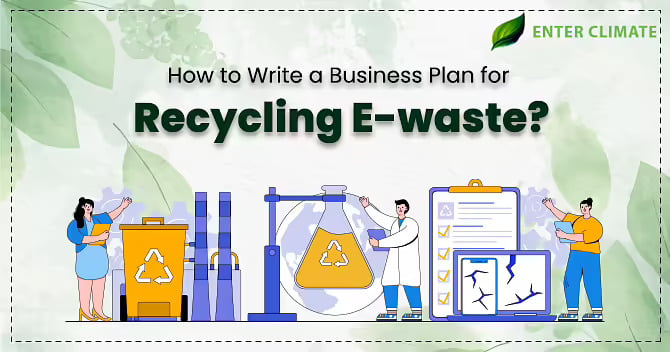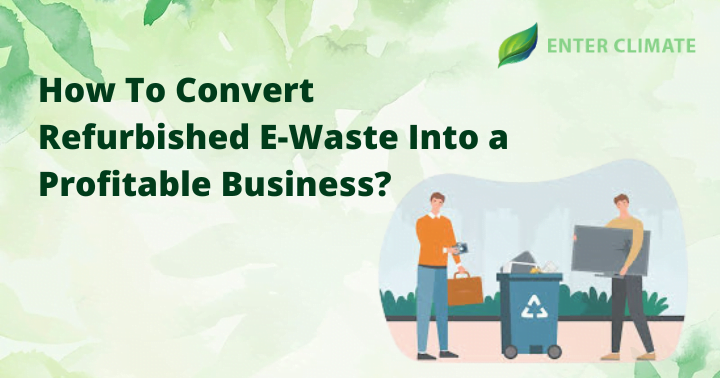How to Write a Business Plan for Recycling E-waste?
 10 Aug, 2022
10 Aug, 2022 
With the constants influx of new technology and gadgets in the market, the amount of E-Waste is also growing, causing the need for proper classification of E-Waste into different categories to make it easier for business plan for E-Waste Recycling plants to function and operate: –
- Large Cooling household appliances, which include Refrigerators, Microwave ovens, Home air conditioners, etc.
- Small Household Appliances including Electric stove, kettle, etc.
- IT Equipment which includes Computers, monitors, laptops, etc.
- Consumer appliances including Television, Setup Boxes, AC, etc.
- Lamps and luminaries include LED lamps, fluorescent lamps, high-intensity discharge lamps, etc.
- Medical Devices including Copier, IT Servers, Cords and Cables, etc.
- Toys
- Tools
- Monitoring andControlling Instruments
- Automatic Dispenser
In India, under E-Waste (Management) Rules, 2016, E-Waste is only categorized into two types for the purposes of Extended Producers’ Responsibility which are:-
- Consumer Electrical and Electronics
- Information Technology and Telecommunication equipment
Market Overview of E-Waste Recycling plant
Covid-19 has seen an unprecedented rise in the use of technology and EEE (Electrical and Electronic Equipment), ultimately increasing discarded WEEE (Waste Electrical and Electronic Equipment). This rise of E-Waste in India has proven to be very lucrative in establishing an E-Waste Recycling plant with an abundance of raw materials to extract precious metals and elements from. The market for E-Waste recycling plants has seen tremendous growth, developing at the CAGR (Compound Annual Growth Rate)[1] rate of 1.8% since 2025, with the estimation of reaching 45.78 Billion Dollars by 2025.
Business plan for recycling E-Waste
A business plan is described as a written document that contains a basic understanding of the business and all the internal and external elements necessary for establishing a new business. It also includes the nature and scope of business prospects along with financial, marketing, manufacturing, and human resources strategy.
Purpose of Business Plan for Recycling E-Waste
Formulating a business plan for recycling E-Waste serves multiple purposes for the recyclers, including:-
- Designing a roadmap
It serves as a roadmap for recyclers and plant owners. It helps recyclers in setting objectives and strategies for E-Waste Recycling plants.
- Making investors familiar
A good Business plan acts as a manual for investors to make them familiar with the recycling of E-Waste, Why is it needed, and what is the financial strategy adopted by recyclers. It assists investors in making better-informed decisions on the investment.
- Raising a loan from a bank.
Similar to investors, Business Plan for Recycling E-Waste act as a guidebook to make them aware of the current and future prospect of the business, including market overview and Financial Strategy.
- At last, business plans are also required to be submitted to the government authorities; for example, when establishing a recycling unit, the recyclers have to acquire Consent to establish
Content of Business Plan for Recycling E-Waste
While framing a business plan, the recycler must ensure the structure correctly reflects the business’s objective and scope of the business. The structure of the Business plan for Recycling E-Waste includes:-
- Business Overview
The business overview includes the key concept and strategy on which the recycling business is based on. It also contains the long-term and short-term commitments set by the recyclers pertaining to E-Waste recycling and business growth.
- SWOT Analysis
SWOT Analysis includes strengths of the business as well as weaknesses, opportunities, and threats concerning a particular operation. It comprises of strengths of the company, including advantages, skills, and experience in the field of e-Waste recycling or any other factor that can be added as a positive attribute to the business profile of the recycling plant. Apart from Strengths, SWOT analysis also tells the possible weakness of recycling plants, Opportunities in the market that can assist in the growth of the recycling unit, and at last, the analysis must contain the possible thread which can have an adverse effect on the development of the market.
- Industrial Analysis
Industrial Analysis include future market trend and the current standing of the Recycling Plant. It may also include an analysis of the potential competitors that can have an effect on the overall business of the market.
- Overview of Demographic and Geographic
Overview of Demographics and Geography includes the analysis of the group of the customer base of E-Waste recycling plan within the stipulated area either categorized based on income, occupation, or the location where the Recycling Plan is located.
- Product Analysis
The business plan for recycling E-Waste also includes a detailed description of the Product manufactured by the recyclers at the end of the recycling process.
- Operational Strategy
Operation Strategy includes Production analysis, budgetary plan as well as Human Resource Plan. This strategy includes a complete financial proposal for operational units, a memorandum of undertaking with banks as well an analysis of human resources working for the organization.
Importance of Business Plan for Recycling E-Waste
A business plan has many advantages, which make it very important for recycling plants in terms of attracting potential investors and employees. Some of the important reasons for formulating a Business plan are: –
- While preparing the business plan, the recycler becomes more aware of the roadmap of the business and issues relating to it.
- A good business plan provides a clear idea about the mission of the recycler to all the stakeholders, including potential investors.
- The business plan also helps recyclers to identify the future prospect of the market and the success of the business.
- A good business plan can also use as a selling document to strangers.
Conclusion
Business plans for recycling E-Waste have proven to be an essential tool that is required by the recyclers to set up a recycling plant. It provides answers to various questions that may emerge in one’s mind, including when, how, where and which market.
Categories
Latest Post
Air pollution Dispersion Modeling
Natural Disaster Risk Assessment
Endangered Species Protection
Aquifer Recharge Project
Sustainable Sanitation Solutions














